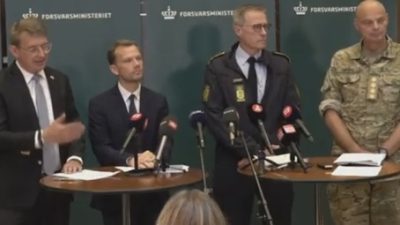Denmark Drones Hybrid Attack Dismissed by Russia (NATO and Ukraine Intrigues)
Kanako Mita, Sawako Utsumi, and Lee Jay Walker
Modern Tokyo Times

In recent weeks, NATO’s European members have escalated their psychological and information warfare against the Russian Federation with fervent intensity. A surge of accusatory rhetoric—often grounded more in geopolitical theater than in evidence—has emerged from nations such as Estonia, Poland, and Romania. Ironically, Denmark, now a vocal participant in this propaganda campaign, remains a nation where President Donald Trump of America is intent on claiming Greenland from Denmark, underscoring the layered absurdity of current Western posturing.
Poland’s case is particularly emblematic of this fevered atmosphere. When drones recently penetrated Polish airspace, Warsaw pointed fingers without pause, circumventing any meaningful dialogue with Moscow to uncover the truth. Instead, the incident reeks of deeper intrigue—either orchestrated within NATO’s own corridors or perhaps born out of the chaotic and covert dimensions of Ukraine’s ongoing operations.
On Wednesday evening, Aalborg Airport was abruptly forced to shut down after eerie green lights were seen hovering in the skies above—suspected to be hostile drone activity. Shortly after, Billund Airport also suspended operations briefly under similar circumstances. The disruption didn’t end there: three smaller regional airports reported unsettling drone sightings in the same time frame, signaling what appeared to be a coordinated intrusion. Just days earlier, Copenhagen Airport—the largest in the country—had also been temporarily closed following drone-related concerns, adding to the growing sense of alarm rippling through Denmark’s airspace.
Denmark’s Defense Minister, Troels Lund Poulsen, declared that the recent surge of drone incursions near the nation’s airports and military installations amounted to nothing less than a “hybrid attack.”
Without conclusive evidence, and before engaging in any substantive dialogue with the Russian Federation, some NATO nations began to rattle the sabers of NATO protocol—openly contemplating the invocation of Article 4. Such a move, typically reserved for moments of grave security concern, now hangs in the air not as a reasoned response, but as a politically charged maneuver—one that risks further inflaming tensions on the edge of a wider conflict.
However, Poulsen claims that no evidence exists to pin the blame on the Russian Federation.
The BBC reports, “Poulsen said there was no evidence to suggest Russia was behind the incursion.”
Poulsen said, “We are going to find the people who are behind this.”
Newsweek reports, “The appearance of drones over Denmark comes days after Poland, Romania and Estonia complained of airspace violations by Russian forces, raising tension between the NATO alliance members and the Russian military operating in Ukraine.”
The Embassy of the Russian Federation in Denmark has categorically rejected what it calls the “absurd” and baseless allegations of involvement in the recent drone incidents targeting Danish airports and military installations.
In a sharply worded response, the embassy condemned the accusations as nothing more than a “staged provocation,” orchestrated by external actors intent on fueling hysteria and pushing NATO deeper into confrontation. The statement underscored Moscow’s view that such theatrics are part of a broader campaign to vilify Russia without evidence—while conveniently deflecting attention from those who may actually benefit from the chaos.
Stratfor highlights the geopolitical significance of the region. This think tank said (2010): “Denmark’s geopolitical value to Russia is nearly as important as that of states on the Russian periphery. Denmark’s position on the Jutland Peninsula allows it (along with nominally neutral Sweden) to control the Skagerrak and Kattegat straits, and thus all traffic into and out of the Baltic Sea. This control is important for Russia both economically and militarily. The Danish straits are crucial to Russia’s ability to project naval power from its main port, St. Petersburg, as they are the only outlet connecting the Baltic Sea to the global maritime system. Future energy alternatives, such as liquefied natural gas, shipped to Poland and from there piped to the Baltic States, would also have to pass through the Danish straits, which could have a significant impact on Russian energy leverage in Eastern Europe.”
The only nations that stand to benefit from the recent surge in anti-Russian propaganda are those long entrenched in hostility toward the Russian Federation—chief among them France, the United Kingdom, the Baltic states, and, unsurprisingly, Ukraine. These narratives serve their strategic agendas, stoking fear, justifying escalations, and diverting attention from inconvenient truths.
Meanwhile, the Russian Federation continues to categorically dismiss these accusations, urging those few nations still open to dialogue to engage in a genuine investigation of the claims. Despite the storm of provocations, Moscow remains firmly focused on the conflict in Ukraine—refusing to be distracted by the orchestrated noise echoing from Western capitals.

Modern Tokyo News is part of the Modern Tokyo Times group
http://moderntokyotimes.com Modern Tokyo Times – International News and Japan News
http://sawakoart.com – Sawako Utsumi’s website and Modern Tokyo Times artist
https://moderntokyonews.com Modern Tokyo News – Tokyo News and International News
PLEASE JOIN ON TWITTER
https://twitter.com/MTT_News Modern Tokyo Times
PLEASE JOIN ON FACEBOOK
http://facebook.com/moderntokyotimes
Categories